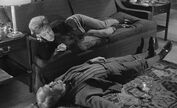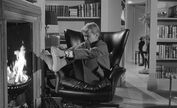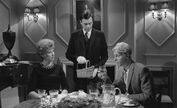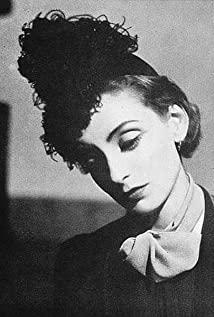The master and the servant, in Hegelian writing, are a dialectical relationship of mutual transfer. In the process of giving orders, the master divided the real power to associate and operate with the possessions to the slaves/servants. In this process, the master's "self-reliance" dissolves on its own, and he is also relying on the servants. Therefore the servant is also the master of the master, and the master is also the slave of the slave.
In "The First Half of My Life", Pu Yi recalled his daily life as a child, and two dozen minions lined up behind him ("tail" in Puyi's language). When I was young, an important entertainment was to lead this long line of eunuchs and maids to run around in front of the Hall of Supreme Harmony, running into a greedy snake (or like Fabre said, circling around the flowerpot) The pine caterpillar), no one dared to take a shortcut from the middle of the circle and walk to the little emperor's side. The little emperor was always happy, and behind him was a set of wash basins, snacks, and gowns. These slaves are like his limbs, and the responsibility for accessing objects—even the power—is in the hands of these “tails”. That's how the emperor made it. Pu Yi later commented that when Emperor Jiajing finally hanged himself in Meishan, Beijing, only one eunuch was behind him. Puyi language: "I think it's enough for him to hang himself"
The following is the chapter on self-consciousness in the "Phenomenology of Mental Phenomenology", the chapter on the truthfulness of the certainty of consciousness itself, a subsection in "Independence and Dependence of Self-consciousness: Master and Slave", 3. Master and Slave. Excerpted from the 1981 edition of the Commercial Press.
1. Domination: The master is a moment of self-existence, but it is no longer just the concept of self-existence, but the consciousness of self-existence. This consciousness is through another momentary self and self-combination, that is Through such a consciousness, its essence is to belong to an independent existence, in other words, its essence is to belong to a general thing. The master is related to these two links. On the one hand, it is related to an object, and the object is the object of desire, on the other hand, it is related to consciousness, and the essence of this consciousness is the object or the nature of the object. Because the master first as the concept of self-consciousness is directly related to self-existence, but secondly, it now acts as an intermediary or as self-existence at the same time, and this self-existence can only become its self-existence through the other party’s media. Therefore, the master is directly related to both parties first, and indirectly related to each party through the other party. The master indirectly associates himself with the slave through independent existence, because it is in this relationship that the slave becomes a slave. This is the chain that he has not been able to break free in the struggle, and thus proves that he is not right, and he has independence only in the form of things. But the master has the power to dominate his existence, because in the struggle he proved that this existence is only a negative thing for him. Since the master has the power to dominate his existence, and this existence has the power to dominate its opponent (slave), so in this process, the master puts his opponent under the control of his own power. Similarly, the master has an indirect relationship with things through slaves. Slaves, as a general self-consciousness, also have a negative relationship with things, and can sublate things. But for slaves, things are also independent, so through his negation he cannot eliminate things all at once, that is to say, he can only process and transform things. On the contrary, through this kind of intermediary, the host's direct relationship with the object becomes a pure denial of the object. In other words, the host enjoys the object. What he could not obtain by pure desire, he now obtains, and enjoys it, and is satisfied in the enjoyment. Desire alone cannot obtain these, because things also have their own independence. But the master puts the slave between the thing and himself. In this way, he only combines himself with the non-independence of the thing, and enjoys it to the fullest; but he surrenders the independence of the thing to the slave, Let slave 1 process and transform things.
In these two links, the master is recognized as the master through another consciousness, because in them, the latter is affirmed to be non-primary. For a specific existence, in both cases, he cannot become the master of destiny, achieving absolute negativity. So there is a side of recognition here: that other consciousness (slave) has abandoned his own existence or independence, and what he himself does is exactly what the master wants to do to him. There is also another aspect: the actions of the slave are also the actions of the master himself, because what the slave does is really what the master does. For the owner, only self-existence is his essence. He is a pure negative power. For this power, things are nothing. Therefore, in this relationship, he is the purely primary action, but the slave is not, he is just a non-primary action. But in order to achieve true recognition, there is still a lack of such a side: if the master did to the slave, he should do the same to himself, and if the slave did to himself, he should also do the same to the master. From this it appears that a one-sided and unbalanced recognition has taken place here.
In this case, the non-primary consciousness is the object of the master, and this object constitutes the truthfulness of his belief in himself. However, it is obvious that this object does not conform to his concept, because the master of the party has completed his place as the master, but something that shouldn't be done for him as an independent consciousness has happened to him. What he has accomplished is not an independent consciousness, but a non-independent consciousness. Therefore, the certainty he reached is not taking self-existence as his truth; instead, his truth is non-primary consciousness and non-primary action of non-primary consciousness.
In this view, the truth of independent consciousness is slave consciousness. It is true that slave consciousness initially seems to be outside of the independent consciousness itself, not the truth of self-consciousness. But just as the master indicated that his essence is the opposite of what he is willing to do, so, in the same way, the slave also transitions to the opposite of his direct position in the process of his own completion. He becomes the independence that forces himself to return to his consciousness and transform himself into reality.
View more about The Servant reviews










